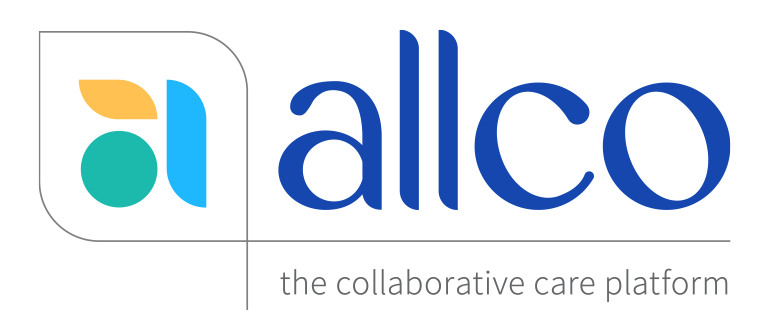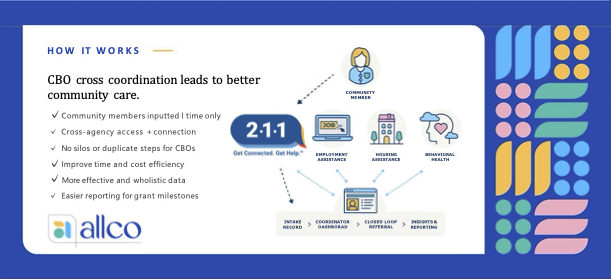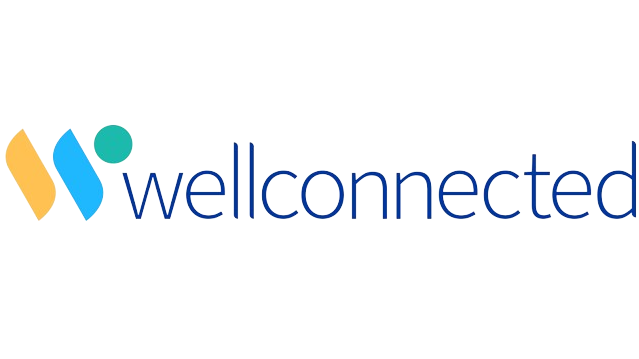[Welcome to Stephen Butzler, Community Engagement Lead for wellconnected, who is joining us on the blog today to share insights about their work in partnership with 2-1-1 providers in New York state and beyond. Hi Steve!]
On behalf of wellconnected, I’m excited to introduce the allco platform and our vision for Community Information Exchange in Western New York and beyond.
As reported last year in BuffaloInno, the vision for allco emerged when our co-founders observed – through their consulting practice with local community-based organizations – many different non-profit initiatives are struggling with some common problems.
Many community organizations here are required by different funders to produce different reports, often using specific information systems and formats, which leads them to conduct redundant and fragmented data collection processes – and yet, even with all this data collection, they told us they are still unable to “see the big picture.” Despite a proliferation of data systems, these organizations can’t aggregate longitudinal data about their clients that can inform analysis of their impact and unmet needs in the community.
We did find some examples of collaboration that led to greater impact in our community – primarily among small networks of CBO’s in which leadership and staff knew each other, and the organizations were familiar with working together. But without interoperable technologies, these successful efforts struggled to scale in any way – vertically, horizontally, or regionally. Sometimes organizations would even be co-located in the same building, and share clients and even the same technology system, but could still not exchange data in real-time.
 By leveraging Open Referral’s specifications and vision in our allco platform strategy, we’ve now enabled a diverse range of social care providers to benefit from a standards-based approach to data storage, aggregation, search, and interoperability.
By leveraging Open Referral’s specifications and vision in our allco platform strategy, we’ve now enabled a diverse range of social care providers to benefit from a standards-based approach to data storage, aggregation, search, and interoperability.
Open Referral has developed tools for interoperability with which we can build solutions for one important piece of this puzzle: the need for reliable, consistent, interoperable directory information that could be accessed and used by any organization within their own workflow. So we’re thrilled to be able to use the Human Service Data Specification to enable sharing of resource data among a network of service providers through allco’s platform.
Sharing resource information: just one step toward a broader vision.
With the emergence of “value-based payment” – a healthcare delivery system reimbursement model that rewards CBOs for achieving positive health outcomes – CBOs are increasingly able to seek reimbursement for prevention, early intervention, and other non-clinical interventions that can improve health outcomes and reduce healthcare costs. In this context, CBOs may enter into agreements with Managed Care Organizations (MCOs) to receive payment for services such as care coordination, health education, social support, and other interventions that improve overall health and well-being, which are fundamental features of allco.

In allco, we’ve envisioned a centralized intake and referral system that is designed to enable cooperation across many organizations and even technologies – in order to both improve service delivery and also build capacities to “see” that “big picture.” We’ve already built out and proven the value of the core of this system, which supports needs identification, resource discovery, “warm” referrals and feedback from referred-to providers to “close the loop.”
allco can also be used by program administrators to manage the entire cycle of their program, from application to intake to enrollment to results.
And best of all, we’ve taken an API-first design approach to ensure that all of these operations can be used modularly and across many third-party technologies. One of our guiding principles is that data from a community should be considered that community’s asset; this means that we are merely facilitating the flow of data that is stewarded by CBOs and their community at large.
2-1-1 at the core of our community-centered strategy
Initial development for allco was funded by a “moonshot grant” through the Health Foundation of Western and Central New York, in partnership with the Healthy Community Alliance. This funding enabled us to convene stakeholders and collectively shape this vision, then form a pilot project to test these ideas, and finally design arrangements for governance and sustainability.
From the beginning, the 2-1-1 provider in Western New York (VIA) has been one of the key partners at our table – and over time, our vision has evolved such that 2-1-1’s role is increasingly central for this system. We found that community organizations want to use 2-1-1’s resource directory information – but lack the ability to bring this critical data into their own workflows. Using HSDS, our small team was able to rapidly prototype and evolve an interoperable, highly-scalable solution that establishes 2-1-1 as the provider of resource data as a service to the many third-party partners across our network. In addition to this resource data supply, 2-1-1 can also provide our partners with care coordination support to help their clients find their way to useful services – essentially forming a centralized intake and referral system, through which the contextual information that 2-1-1 collects on the phone can be shared with our CBO partners instantaneously. We believe that the key to scaling these partnerships is building 211’s capacity to provide these services to our community.
Moving forward, we recognize that much of the challenge before us is not just about technology but about institutional design and governance. We are committed to ensure that data about our community, from our community, remains in the control of our community. All data about clients that passes through the allco platform is housed in a secure Azure environment hosted by our region’s Healthy Community Alliance. Our pilot partners themselves form the backbone of agency-driven governance of the data, and we are now developing responsible institutional arrangements that can equitably steward these resources over time.
Building a collaborative care network
allco is consistently expanding its regional network. Over 200 agencies have updated and actively manage their profiles on our directory, utilizing the platform for both referral management and profile updates. Meanwhile, 58 agencies have licensed users specifically for Case Management, Assessment Delivery, and facilitating Outbound Referrals. The diversity of agency categories and their functions continues to grow. Several municipalities and clinical care organizations are now on the platform. Moreover, we have recently integrated a statewide maternal and pediatric mental health network, alongside a regional health insurance provider. 2-1-1 WNY continues to generate hundreds of outbound referrals daily. This not only expands our network organically but also encourages agencies to actively oversee their incoming referrals and initiate care coordination, leveraging the initial insights provided by 2-1-1 during intake.
We are also evolving the revenue sharing model with which we will be able to leverage with other 2-1-1s – essentially a portion of all users’ licenses in their catchment area (as determined by agency profiles that are stewarded by a 2-1-1 provider). The platform is free for all 2-1-1s; CBO pricing is set at $12/month/user.
We’re enhancing our platform by incorporating additional program development functions. This empowers 2-1-1 to provide an even broader range of services via the platform. This advancement solidifies 2-1-1’s position as a hub for regional programming. Many upcoming features in our short to medium-term product roadmap focus on standardizing data across the network.
Looking to the future: seizing the value-based payment opportunity
One of the underlying end goals for the allco platform is to unlock value-based payment models between healthcare and social care – so that healthcare providers can reimburse more kinds of social care, and in turn community organizations can build more capacity for such care, in ways that improve overall outcomes for the community. This type of VBP model can only be made possible by standardizing key data flows across the entire network.
A shared service directory for regional services based on the Open Referral protocols kick-starts this entire effort. A next step is to agree on baselines and establish desired regional outcomes. allco lays the foundation for standardized community member data, and future feature sets open up the possibility of aligning specialized data curation across organizations.
If you are a Call Center, a Community Based Organization, a Grant Funding Agency, a Municipality, or a Managed Care Organization and you are interested in talking about innovative Case Management platforms, Closed Loop Referral Networks, or Value Based Payment Models, we want to talk with you. If you are interested in learning more about the allco platform, or would like to see a demonstration, please contact me at [email protected] or visit our website at getwellconnected.co.


Leave a Reply